Quiz #10:
Are wages taxable as income?
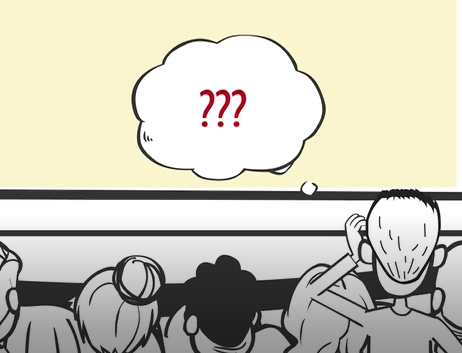
This page changed with the May 07, 2024 edit.
To move all ads to bottom of screen, shrink the window width
Be part of the success!
Help spread the word!

This page changed with the May 07, 2024 edit.
The following definitions for income and wages prove the point. Amendment 16 was ratified about 1913. The 1919 and a few later definitions can be seen on the page linked at the bottom of this article; they simply show who the definitions tend to reflect government actions; when it is government actions that must reflect pre-existing definitions; especially when The Constitution does not grant the power to define or redefine the words.
Both of them are tied to The Constitution of the United States of America, Amendment 16; which states:
"The Congress shall have power to lay and collect taxes on incomes, from whatever source derived, without apportionment among the several States, and without regard to any census or enumeration."
Caution must be exercised when selecting the dictionary from which to define Amendment 16 words.
Old Dictionary Time:
What are wages and what is income?
When did Congress pass the proposed Amendment 16; in order for the States to consider its ratification?
Though the states ratified Amendment 16 in 1913; its content was being discussed in congress during 1909, the year it passed in Congress.
Are wages and income synonymous?
First, all the definitions.

Income
1. That gain which proceeds from labor, business or property of any kind; the produce of a farm; the rent of houses; the proceeds of professional business; the profits of commerce or of occupation; the interest of money or stock in funds. Income is often used synonymously with revenue, but income is more generally applied to the gain of private persons, and revenue to that of a sovereign or of a state. We speak of the annual income of a gentleman, and the annual revenue of the state.
Notice: The gain which proceeds from labor... the profits of commerce or of occupation... the interest of money... the gain of private persons. Notice what is not here; yet. No mention of wages or salary, both connected to labor.
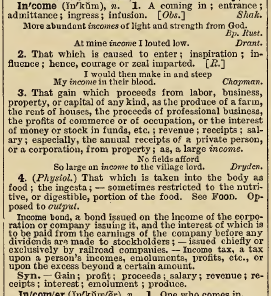
Income
3. The gain which proceeds from labor, business, property, or capital of any kind, as the produce of a farm, the rent of houses, the proceeds of a professional business, the profits of commerce or of occupation, or the interest of money or stocks in funds, etc.; revenue; receipts; salary; especially, the annual receipts of a private person or a corporation, from property; as a large income.
Notice: The gain which proceeds from labor... the profits of commerce or of occupation... the interest of money... Notice the inclusion of salary; but not yet, the inclusion of wages. Salary is paid to upper management. Wages to the unskilled laborer.

Wage
5. To take to hire; to hire for pay; to employ for wages; as waged soldiers.
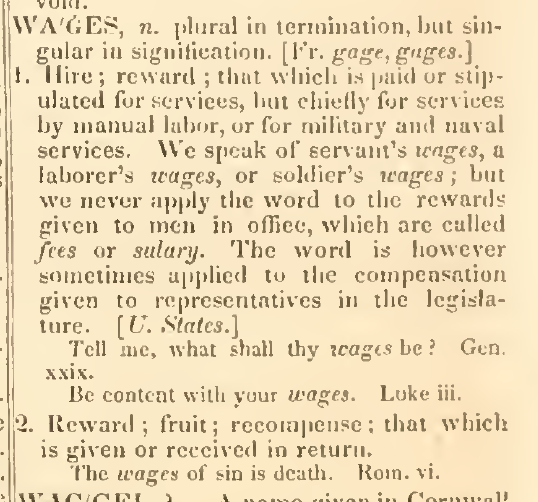
Wages
1. Hire; reward; that for which is paid or stipulated for services, but chiefly for services by manual labor, or for military and naval services. We speak of a servant's wages, a laborer's wages, or a soldier's wages; but we never apply the word to the rewards given to men in office, which are called fee or salary. The word is however sometimes applied to the compensation given to representatives in the legislature.
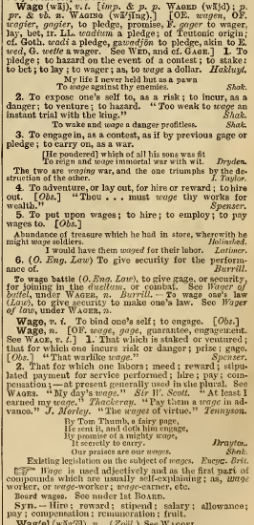
Wage
2. That for which one labors; mead; reward; stipulated payment; —at present, used in the plural. See Wages.
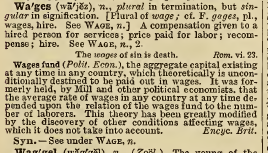
Wages
A compensation given to a hired person for services; price paid for labor; recompense; hire. See Wage, n. #2
"The Congress shall have power to lay and collect taxes on incomes, from whatever source derived, without apportionment among the several States, and without regard to any census or enumeration."
Amendment 16 grants to Congress, the power to tax Incomes, from whatever source derived.
A power not granted to Congress is the power to define what is income. Congress possesses no authority to define what is income. Only to tax that which is. Therefore; Congress is not authorized the power to include —Wages; and tax it as though it were income.
With respect to labor, income is "the gain which proceeds from labor" (1898 definition). When the employer receives more value than the value the employer pays to the employee; the employer has gained from their employee's labor. The employer, then, owes income tax on that gain from their employees' labor.
With respect to labor, wages is "the compensation for labor"; (1898 definition). Wages, therefore, are not income, because they are not a gain to the employee. The Constitution of the United States of America does not grant a direct tax or any other tax on wages. Wage tax, is therefore, unjust and unconstitutional.
Power expressly prohibited to Congress when taxing income; is that Congress is prohibited from using a census and from using an enumeration.
These prohibitions open up some really interesting probabilities for funding government.
When the government uses an unconstitutional way of adjusting or redefining words used in The Constitution; This directly violates the Article 5 Amendment process. In violating The Constitution, Congress commits treason, as detailed in Article 3, Section 3.
Yes. The Constitution of the United States of America is a "living" document, in that it is supposed to be kept current with an ever-changing society. That is the purpose for Article 5. That amendment process does not include the use of more modern dictionaries to redefine constitutional content to make it appear as though congressional actions comply with constitutional restraints. If an error of omission was made in the Constitution, at the time it was ratified; simply propose another amendment to clear up the matter.
More details at
Stop the Unconstitutional Wage Tax where it compares 1828, 1898, 1916, 1960 and 2024 definitions.
Quiz #11: Is the Income Tax Code constitutional?
The governed people, are intended to work together to properly control their government's powers to equally protect each other's rights.
Share any content within this website. Get others talking about —Getting & Keeping Clean Honest Government.
[End Page Content]
To move all ads to bottom of screen, shrink the window width
Help make it happen!
Help spread the word!